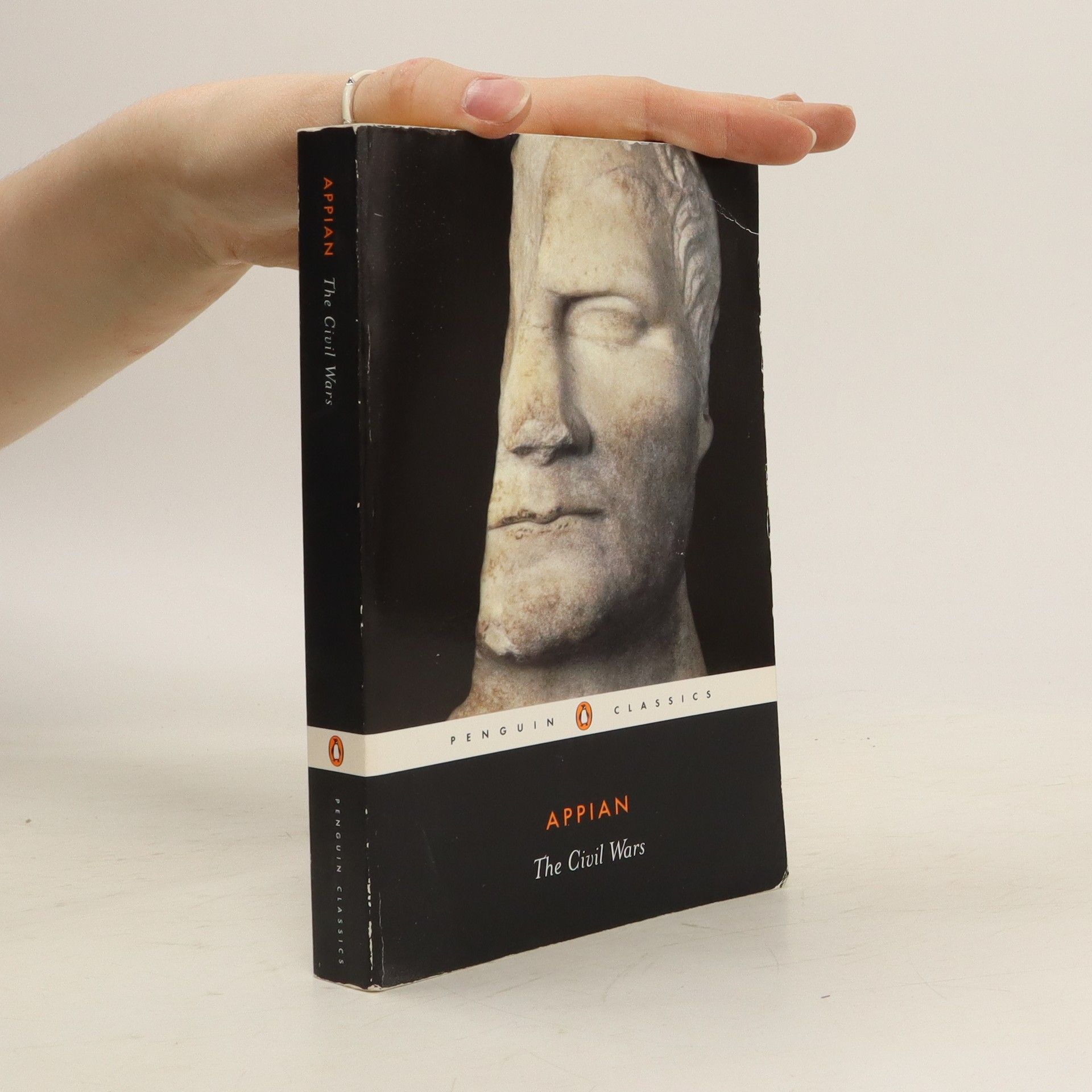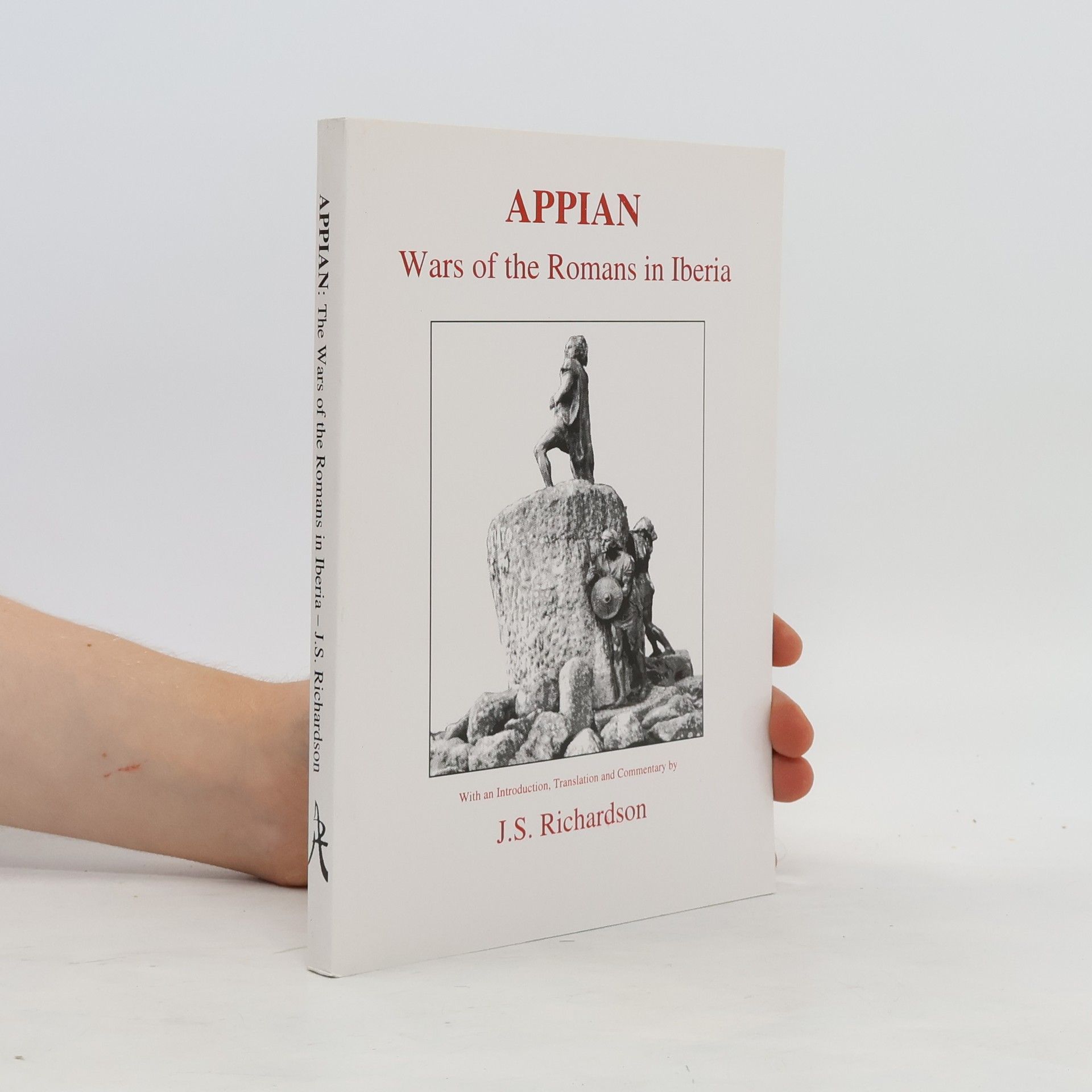Gappian wrote his Roman History in the second century AD as a series of books arranged geographically to chronicle the rise of the Roman empire. His Iberike, of which this is the first translation with historical commentary in English, deals with the Romans' wars in the Iberian peninsula from the third to the first centuries BC.
Appiános Libros







Roman History, Volume V
- 400 páginas
- 14 horas de lectura
Appian (ca. AD 95-161) is a principal source for the history of the Roman Republic. His theme is the process by which Rome achieved her contemporary prosperity, and his method is to trace in individual books the story of each nation's wars with Rome up through her own civil wars. This Loeb edition replaces the original by Horace White (1912-13).
Roman History, Volume VI
- 400 páginas
- 14 horas de lectura
Appian (ca. AD 95-161) is a principal source for the history of the Roman Republic. His theme is the process by which Rome achieved her contemporary prosperity, and his method is to trace in individual books the story of each nation's wars with Rome up through her own civil wars. This Loeb edition replaces the original by Horace White (1912-13).
The Civil Wars
- 480 páginas
- 17 horas de lectura
Appian's Civil Wars offers a masterly account of the turbulent epoch from the time of Tiberius Gracchus (133 BC) to the tremendous conflicts which followed the murder of Julius Caesar. For the events between 133 and 70 BC he is the only surviving continuous narrative source. The subsequent books vividly describe Catiline's conspiracy, the rise and fall of the First Triumvirate, and Caesar's crossing of the Rubicon, defeat of Pompey and untimely death. The climax comes with the birth of the Second Triumvirate out of anarchy, the terrible purges of Proscriptions which followed, and the titanic struggle for world mastery which was only to end with Augustus's defeat of Antony and Cleopatra. If Appian's Roman History as a whole reveals how an empire was born of the struggle against a series of external enemies, these five books concentrate on an even greater ordeal. Despite the rhetorical flourishes, John Carter suggests in his Introduction, the impressive 'overall conception of the decline of the Roman state into violence, with its sombre highlights and the leitmotif of fate, is neither trivial nor inaccurate'.
Roman History, Volume IV
- 400 páginas
- 14 horas de lectura
Appian (ca. AD 95-161) is a principal source for the history of the Roman Republic. His theme is the process by which Rome achieved her contemporary prosperity, and his method is to trace in individual books the story of each nation's wars with Rome up through her own civil wars. This Loeb edition replaces the original by Horace White (1912-13).
Římské dějiny I. Římské dějiny, jež sepsal ve 2. stol. n. l. řecký historik Appiános, obsáhly ve svém původním rozsahu osudy Říma od jeho legendárních počátků až po vládu císaře Triana. Tímto dílem se Appiános pokusil dát kromě jiného i odpověď na otázku, proč bylo nastolení římské nadvlády nad staromořským světem historickou nutností. Je příznačné, že hlavní příčinou spatřoval především ve vojenské převaze Říma a v diplomatických i taktických schopnostech jeho představitelů. Slabost jejich soupeřů shledával v jejich izolovanosti, a nikoli v menším vojenském nadání nebo v nedostatku osobního hrdinství a obětavosti. Tento aspekt se projevil zejména v těch částech díla, jež zachycují pronikání římské moci do různých oblastí středomořského světa. Vznik římského impéria se tak stal společným jmenovatelem řady zachovaných částí Appiánova historického spisu.
Krize římské republiky
- 495 páginas
- 18 horas de lectura
Římské dějiny II - Občanské války. Alexendrijský Řek Appiános, narozený na sklonku 1. století našeho letopočtu, vylíčil nejen vznik římského impéria a jeho rozpínavost, nýbrž i dějiny římských občanských válek. V pěti knihách, které jim věnoval, sleduje dlouhou a téměř nepřetržitou řadu sociálních a politických konfliktů od poslední třetiny 2. století př. n. l. až do roku 35 n.l. Hnutí bratří Gracchů, kteří své reformy zaplatili životem, válka se spojenci, politické vyrovnání mariovců a sullovců, vzpoura otroků vedených Spartakem - to jsou úseky z římských dějin, o ncihž Appiános pojednává podrobně i se zaujetím v první knize. Dále pokračuje scénami z bojů mezi Caesarem a Pompeiem, Caesarovým vítězstvím i jeho vraždou. Ještě větší napětí vkládá do vyprávění o marném zápase Bruta a Cassia za republikánskou svobodu. Nečekané zvraty provázejí stejně nečekaný a energický vstup devatenáctiletého Octaviana, Caesarova adoptivního syna a pozdějšího císaře Augusta, do neklidného politického života po Caesarově smrti... Ve svém díle se Appiános zaměřuje na významné politické osobnosti - v souladu se starověkou koncepcí historie je totiž povaužje za hlavní činitele dějin - a přibližuje čtenáři jejich velikost nebo malost, odhaluje příčiny a souvislosti jejich vítězství i proher, klade závažné otázky a snaží se nalézt a nalézá zajímavé, i když mnohdy velmi subjektivní odpovědi.
